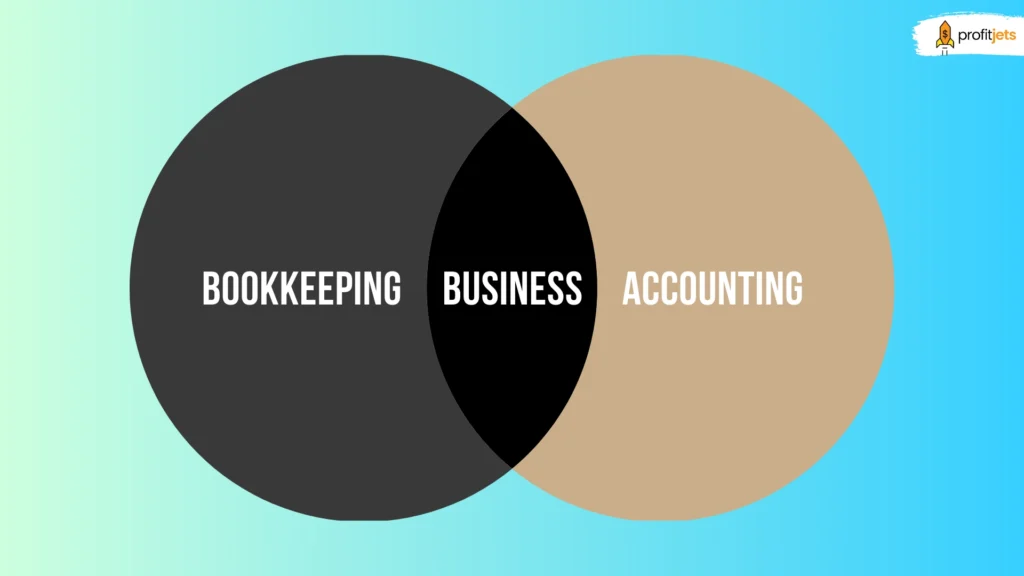Accurate and effective financial management is critical for businesses to thrive in today’s increasingly competitive market. This is when bookkeeping comes in handy.
According to a recent National Association of Bookkeeping Professionals (NABP) survey, 95% of small and medium-sized firms in the United States use bookkeeping services to check their financial health.
For example, online furniture retailer Wayfair attributed its 53% growth in yearly revenue in 2021 to implementing a solid bookkeeping system that provided real-time insights into its financial performance.
This enabled them to make more informed judgments about resource allocation, inventory management, and marketing tactics, resulting in tremendous growth.
In this article, you will learn about what bookkeeping is, its importance, when to use it, and the different types of bookkeeping.
Table of Contents
What is Bookkeeping?
Bookkeeping is the systematic recording of a company’s financial transactions. It entails documenting income, expenses, assets, liabilities, and equity to provide a clear and accurate picture of the business’s financial position.
Consider it the business language. Just like a writer needs words to tell stories, a business needs accurate financial records to understand its performance, make informed decisions, and achieve its goals.
In essence, bookkeeping serves as the backbone of any successful business. By meticulously tracking every financial detail, you gain valuable insights into your company’s financial health, allowing you to identify areas for improvement, maximize profitability, and navigate the ever-changing economic landscape.
Think of it as a roadmap for financial stability and sustainable growth. The more accurate and detailed your financial records are, the better equipped you are to chart a course for success and steer your business to its full potential.
What is the Importance of Bookkeeping?
Bookkeeping is much more than numbers; it is about controlling your business. Here are a few reasons why bookkeeping is essential for success:
- Accurate Financial Reporting
Bookkeeping offers dependable data for generating accurate financial statements such as income statements, balance sheets, and cash flow statements. These reports provide valuable insights into the company’s financial health and enable informed decision-making.
- Tax Compliance
Any firm must avoid penalties and fines. Bookkeeping enables correct and timely tax preparation and filing, allowing you to comply with tax laws.
- Financial Control
Bookkeeping allows you to manage income and expenses, uncover cost-cutting opportunities, and make informed budgeting decisions. This will enable you to deploy resources while maintaining financial stability.
- Attractiveness to Investors and Lenders
Well-maintained books attract investors and lenders by exhibiting transparency and confidence in the company’s financial stability. This can make obtaining money for growth and expansion easier.
- Improved Cash Flow
By analyzing your cash flow patterns, you may foresee probable cash shortages and surpluses, allowing you to properly manage your finances and minimize financial strain.
- Business Expansion
Accurate financial data lets you discover patterns and analyze business performance. This data may be utilized to create strategic plans for growth and expansion, ensuring your company stays ahead of the competition.
- Bookkeeping KPIs
KPIs are crucial tools for measuring the success of bookkeeping services. They support making data-driven decisions, monitoring advancement, and identifying areas of strength and weakness.
What Does a Bookkeeper Do?
A bookkeeper is responsible for recording and tracking all business transactions and handling an organization’s data-entry-related and finance-related tracking. While a Bookkeeper requires skills like attention to detail and a love for numbers, in today’s time, any bookkeeper should have the knowledge and skills to use software that assists and streamlines an organization’s numbers into a visual aid. Here are some of the day-to-day tasks of a Bookkeeper:
- Record daily transactions like sales, purchases, receipts and payments into various assets
- Tracking all transactions linked to accounts receivable and accounts payable
- Maintaining a general ledger and using it to produce financial statements for the organization
- Preparing budget/financial plans
- Issuing invoices to customers
- Payroll processing
A bookkeeper aims to help businesses make informed financial decisions by producing the current organization’s economic health. Bookkeepers will keep your books tax-compliant, allowing you to focus on the bigger picture for your business.
How is Bookkeeping Beneficial for Businesses?
It takes time to do bookkeeping. The motto of digitalization is to make machines simple enough for dedicated tasks, and repetitive tasks can be automated, reducing the time consumption rate. This is why bookkeeping is of such value.
Investing in effective bookkeeping practices offers a multitude of benefits for businesses of all sizes:
- Enhanced Productivity
By saving time and simplifying financial procedures, you can concentrate on your primary business operations.
- Decreased Costs
Profitability is increased, and expenses are reduced when needless spending is found and removed.
- Better Decision-making
Having timely access to accurate financial data gives you the confidence to make well-informed choices.
- Increased Profitability
Reaching financial objectives and maximizing profits are made possible by cost management and resource allocation optimization.
- Better Financial Health
Being aware of possible issues early on enables you to take preventative action and keep your finances stable.
- Enhanced Investor Confidence
Well-kept books encourage confidence in lenders and investors, making it easier to obtain funding for expansion and growth
For small businesses, bookkeeping has undeniable advantages, such as:
- Reduced Costs
Eliminate the need for expensive in-house bookkeeping staff and associated overhead expenses.
- Increased Efficiency
Automate time-consuming tasks and streamline financial processes, freeing up valuable time to focus on core business operations.
- Enhanced Accuracy
Minimize human error through automated data entry and reconciliation features.
- Improved Decision-making
Gain real-time financial insights to make informed and data-driven business decisions.
- Greater Flexibility
Access your financial data from anywhere, anytime, allowing for unparalleled flexibility and work-life balance.

Are Bookkeeping and Accounting the Same?
Although bookkeeping and accounting are sometimes used synonymously, they are different. Despite their differences, both are essential components of financial management.
Consider bookkeeping as a building’s foundation. Gathering and arranging all financial data is similar to how bricks and mortar make up the foundation. Accounting is the architect who examines and deciphers this data, applying their understanding to construct and enhance the framework.
| Feature | Bookkeeping | Accounting |
| Focus | Day-to-day financial transactions | Overall financial health |
| Activities | Recording income and expenses, managing accounts and reconciling bank statements | Analyzing financial data and preparing financial statements |
| System | Single-entry or double-entry bookkeeping | Only double-entry Bookkeeping |
| Output | Financial reports and basic reports, e.g., Income statements | Financial reports, financial analysis, and insights for decision-making |
| Purpose | Track financial health and maintain compliance with tax regulations | Inform strategic decision-making, attract investors and secure funding |
| Target audience | Internal stakeholders (e.g., business owners or managers) | Internal and external stakeholders (e.g., investors, lenders, and creditors) |
Who Needs Each Service?
- Bookkeeping: All businesses, regardless of size, need bookkeeping to maintain accurate financial records. It’s a vital part of any business operation.
- Accounting: While some smaller businesses might handle basic bookkeeping, most benefit from professional accounting services. This is especially true for companies with complex financial needs or those seeking tax advice and financial planning.

What are the Types of Bookkeeping?
There are two main types of bookkeeping, each catering to different needs and complexities. The bookkeeping your business requires is defined by the complex amounts of transactions your organization does.
Single-entry Bookkeeping:
- A more straightforward method is ideal for small businesses with limited transactions.
- Records income and expenses only once
- It does not provide a complete picture of the financial health of a business
Double-entry Bookkeeping:
- A more complex but accurate method
- Record each transaction twice, once as a debit and once as a credit
- Provides a complete picture of the financial health of a business, including assets, liabilities, and equity
Most businesses, especially those with complex financial needs, utilize double-entry bookkeeping for its accuracy and comprehensiveness.
Who Uses Bookkeeping?
All businesses, no matter their size or field of work, need bookkeeping services to stay tax-paying and record all money matters. Keeping books right and complete gives companies accurate reports about their financial situation.
By having a clear view of how well different parts of the business are doing and good financial records, business owners can make critical decisions for both short-term and long-term needs.
Every growing business should focus on good bookkeeping basics. This can be done efficiently by outsourcing qualified bookkeeping experts. Good financial records help with money flow checks, tax filing, and growth strategies in today’s busy business world.
What is Virtual Bookkeeping?
Virtual bookkeeping has revolutionized the way businesses manage their finances. It refers to using online tools and software to manage a business’s finances remotely. This allows companies to access their financial information and work with bookkeepers from anywhere in the world.
Ready to unlock the power of accurate bookkeeping and take your business to the next level? Click here to learn more about our comprehensive bookkeeping services and how we can help you achieve your financial goals.
What are the Benefits of Virtual Bookkeeping?
Embrace convenience and control with virtual bookkeeping: access your finances anytime, anywhere, and benefit from expert support, all with reduced costs and increased efficiency.
Here are some of the additional benefits of virtual bookkeeping:
- Reduced costs: Eliminate overhead expenses associated with in-house bookkeeping staff
- Increased efficiency: Access your financial data and collaborate with your bookkeeper anytime
- Improved accessibility: work with specialized bookkeepers regardless of location
- Increased scalability: Easily adapt your bookkeeping services as your business needs change
- Enhanced security: Enjoy enhanced data security through cloud-based solutions
What is the Bookkeeping Process?
Whether you choose traditional or virtual bookkeeping, the basic process remains the same:
- Gather Documents
Collect all receipts, invoices, bank statements, and other financial records.
- Record Transactions
Enter all transactions into your chosen bookkeeping system. Categorize transactions: Organize transactions into relevant income and expense categories.
- Reconcile Accounts
Regularly compare your records with bank statements to ensure accuracy.
- Generate Reports
Create financial reports such as income statements, balance sheets, and cash flow statements.
- Analyze Reports
Review your financial reports regularly to gain insights into your business performance and identify areas for improvement.
Best Practices of Bookkeeping
Here are some best practices to ensure accurate and efficient bookkeeping:
- Choose the right system: Select a bookkeeping system that meets your needs and budget.
- Use consistent methods: Establish clear and consistent procedures for recording and managing financial data.
- Automate tasks: Take advantage of technology to automate repetitive tasks like data entry and reconciliation
- Regularly back up your data: Protect your financial information by periodically backing up your data to a secure location
- Seek professional help: Consider working with a certified bookkeeper or accountant.
Top Bookkeeping Companies for 2024
Choosing the right online bookkeeping solution can seem daunting, but with careful consideration, choosing the right bookkeeping company doesn’t have to be overwhelming. Here are some popular options for 2024:
Profitjets
Profitjets is a technology-driven accounting solution provider that empowers businesses of all sizes through seamless and efficient bookkeeping services. Teams of seasoned professionals specialize in bookkeeping, accounting, advisory, payroll, and tax compliance. Leveraging cutting-edge cloud-based software ensures your financial data is secure, accessible, and always up-to-date.
Quickbooks Live
QuickBooks Live offers cleanup bookkeeping services for small businesses using the popular QuickBooks software. They specialize in catching up on neglected books, reconciling accounts, and ensuring financial data accuracy. This service is ideal if you need to get your books in order before tackling other accounting tasks.
Botkeeper
Botkeeper provides full-service bookkeeping solutions for accounting firms. They leverage skilled bookkeepers and advanced technology to handle all aspects of bookkeeping, including accounts payable and receivable, bank reconciliations, and financial reporting.
Ignite Spot Accounting
Ignite Spot Accounting specializes in connecting businesses with qualified, certified bookkeepers. They offer a platform for businesses to search for and hire bookkeepers based on their specific needs and budget.
1-800Accountant
1-800Accountant provides a range of bookkeeping services for businesses of all sizes. They offer customized solutions and scalable plans to accommodate individual needs and budgets. Their services include bookkeeping, payroll, tax preparation, and financial reporting.
What Bookkeeping Services Do We Offer?
At Profitjets, we pride ourselves in our timely delivery of your financial health and ensure your company is tax-compliant and ready well before the deadline.
We provide services like:
- Catchup Bookkeeping
We offer top-grade catchup bookkeeping services to meet the specific needs of your business enterprise. We explore all kinds of poor historical accounting and bookkeeping, along with all other monetary transactions for a specified time, and accordingly offer the right solution so that your business organization stays in adherence with the government guidelines.
Our specialized tax consultants offer the best solutions for all your tax-related matters. By collaborating with Profitjets, you can peacefully focus on other aspects of your business, as our certified tax consultants will pay all your taxes on time and meet all deadlines.
- Payroll Processing Services
Managing employee payrolls can become a task, especially for a business owner with multiple tasks. Leave the payroll processing to Profitjets and be worry-free regarding your employee’s payroll.
- CFO Services
Our specialized CFO services are meant to help you achieve your business growth objectives. We offer strategic financial support to meet your business requirements and help you with economic forecasting, fundraising, and other financial services.
Need help keeping up with your bookkeeping? Let us help! Book a free consultation today and discover how our expert bookkeepers streamline your finances and give you valuable time back.

Remember, accurate and efficient bookkeeping is essential for the success of any business. Implement best practices and ensure your financial records are organized, precise, and available for making informed business decisions.
Bookkeeping FAQs
Bookkeeping focuses on recording and organizing financial data, including invoicing, billing, payroll and reconciling transactions.
Bookkeeping costs are determined basis of the experience of the bookkeeper and the firm. Usually, the rates vary geographically.
Start by ensuring all your financial records are available and up to date. Or, speak with a professional bookkeeper to get you started.
You can use many bookkeeping software to get started for your small business. For example, Xero, Freshbooks, QuickBooks Online, Wave, etc., Pick the best one basis your focus area and your compatibility.
A bookkeeper’s duty is to ensure all your financial data is recorded. From vendor transactions to employee payroll, a bookkeeper will record everything.
The biggest advantage of electronic bookkeeping is the error-free recording and time-saving process.
Automating your bookkeeping is fairly simple. Many software ensures the easy integration of all your records into the software.
The average hourly cost for a CPA Is $100 to $300 but, it may vary basis your requirements and the firm you outsource the service from
Bookkeeping services provide you with payroll management, data entry, daily transaction recording, budget planning, tracking all accounts receivable and payable transactions, and much more.
Restaurant accounting involves unique challenges that set it apart from accounting practices in other types of businesses, such as Managing Inventory Costs, Tracking Food Waste Expenses, and Handling Tip Reporting for Employees.






